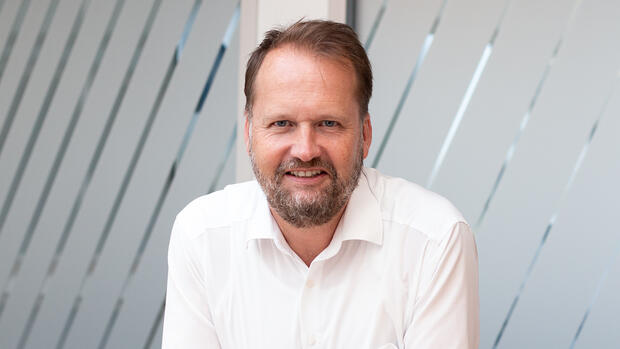Stuttgart It doesn’t matter whether it’s a combustion engine or an electric vehicle – the performance of car components today is determined by the software. Customers whose vehicles need a software update usually still have to drive to the workshop. Even groundbreaking electric cars like Porsche’s Taycan cannot be updated afterwards via the network. The sports cars, which cost more than 100,000 euros, have to be connected to the cable.
Konrad Krafft and his software company Doubleslash have developed a solution to this problem. “Our specialty is IT outside of the car,” says the founder. The core competence of the medium-sized company founded in 1999 is secure data transmission. The industry term for the wireless update is “over the air”.
For customers, the feature is not a minor matter. Among technology-savvy Chinese customers, for example, the otherwise exemplary Taycan is already losing a lot of demand – a trend that should soon be reflected in the German customer base as well.
The second largest German automotive supplier, ZF, recognized the potential of wireless technology quite early on. The foundation group, which grew up with transmissions and chassis, already invested in Doubleslash in 2016.
The software house was already able to score points with experience in projects such as BMW’s Connected Drive and further e-mobility services. Siemens, Deutsche Post AG and Telekom were and still are among the customers.
In 2021, ZF increased its stake from 40 to 51 percent, with Krafft’s blessing: “We approached ZF proactively,” emphasizes the 52-year-old. Among other things, it was about ways to cope with the exit of co-founders and to open up new markets.
The automotive supplier has strengthened the sustainability of its technologies – Doubleslash is an important part of it.
(Photo: imago images/Manfred Segerer)
And that’s how systems from Friedrichshafen made it into the latest model of the Lotus sports car brand, which belongs to the Chinese group Geely. The electric SUV Eletre is delivered with ZF’s Cubix software, which controls all chassis functions, from the brakes and front and rear axle steering to active roll stabilization, which determines cornering behavior. The electric drive also runs on ZF’s software brain.
Doubleslash is one of many examples that show that digital innovations tend to emerge outside of the large traditional groups. An acquisition is no guarantee that a new idea will flourish. Krafft found out early on.
AI specialist with Karstadt experience and as an Amazon competitor
The computer scientist with training in Furtwangen, main discipline artificial intelligence (AI), worked for various IT companies in Germany after his studies. In 1994 he took up a position as a software developer at Neurotec Hochtechnologie GmbH. In 1996, Krafft started developing the first internet applications there.
In the course of this, he developed the first internet shops in Europe together with several teams, under the company umbrella of My-World. This in turn was operated on behalf of Karstadt AG. But in the department store environment, the platform was never a success.
>> Read also: ZF wins world market leader STMicroelectronics as a partner for power-saving chips
“Our software was no worse than Amazon’s,” says Krafft about the US competitor, who was emerging at almost the same time. But the traditional department stores did not understand the online business – as can be seen to this day with the currently corresponding drastic consequences.
In the course of this product development, however, Krafft met five colleagues with whom he founded Doubleslash Net-Business GmbH in 1999. The company name refers to the double slash that is part of every web address to this day. The aim was to use the then young internet technology for internal company processes. Today it offers data-driven services including digital car keys.
Double digit growth and always profitable
ZF’s majority holding has not harmed the company, which operates independently on the market. 280 people now work for the software company. Turnover has risen continuously to 32 million euros. Two-thirds of sales are in the automotive sector. “We have grown by an average of 10 to 15 percent per year and have always made a profit,” assures Krafft.
The second largest shareholder with 24.9 percent is the employee holding company AG. Co-founder and managing director Konrad Krafft still holds 24.1 percent of the shares, but increasingly passes his shares on to employees.
>> Read also: VW and Mercedes let Google and Apple deeper into the car
Employee participation is intended to attract specialists, bind them to the company, motivate them to innovate and one day make it easier to find a successor from within their own ranks. “I know from my own experience that owning shares is an additional motivation to go the extra mile,” explains the founder. And: the value of the shares has increased over the years from initially 28 euros to 170 euros now.
The involvement of his people is very important to Krafft. They were allowed to help design the new office building with a roof terrace directly at Friedrichshafen Airport. Since this year, employees have also had an advisory role in salary formation. “It’s impressive how well this works,” says the founder. “The company’s internal adjustment of the salary levels is already based on a process that all employees can understand and that is communicated transparently and openly every year.”
ZF employee representatives regard Krafft as a businessman with very high integrity. For example, Doubleslash increased the salaries of its employees by an average of 13 percent from January 2023 and by around six to eight percent in the years before, when inflation was close to zero. Equal salary – regardless of gender – has been a matter of course for the company since it was founded.
More: The automotive industry is increasingly relocating production abroad
